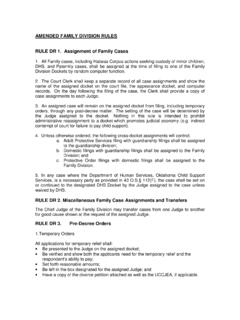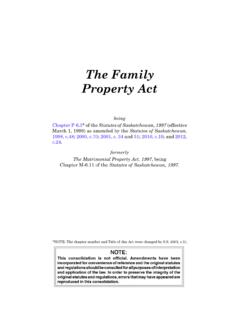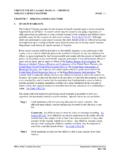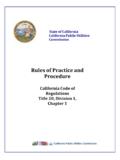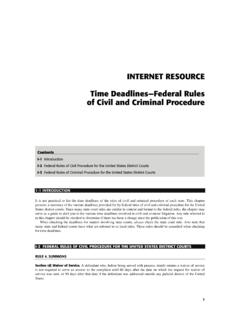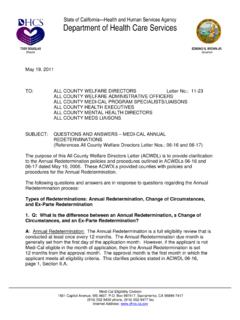Transcription of IN THE HIGH COURT OF SOUTH AFRICA - SAFLII …
1 IN THE high COURT OF SOUTH AFRICA (EASTERN CAPE PORT ELIZABETH)CASE NO.: 812/2012In the matter between:CLIMAX CONCRETE PRODUCTS CCApplicantt/a CLIMAX CONCRETE PRODUCTS CCRegistration Number CK 1985/014313/23 AndEVENING FLAME TRADING 449 (PTY) LTDF irst RespondentLAMPRECHT PROPERTIES CC Second RespondentFRIEDMAN SHECKTERT hird RespondentJUDGMENT BESHE, J:INTRODUCTION[1] This is an urgent application wherein the applicant seeks relief in the following terms:1. That the matter be heard as one of urgency and that the time limits, forms and service provided for in the Rules of COURT are dispensed with in terms of the provisions of Rule 6 (12);2. That the resolution of the first respondent to commence Business Rescue Proceedings be and is hereby set aside in terms of section 130 of Act 71 of 2008 (The Companies Act); 3. The resolution of the second respondent to commence Business Rescue Proceedings be and is hereby set aside;4.
2 The first and second respondents be and are hereby ordered and directed to maintain an amount of no less than R629 at any banking facility held by either the first respondent or the second respondent or in the Trust Account of the third respondent;5. Cost of the application.[2] First and second respondent responded by way of a counter application in terms of which they seek the COURT s approval to file a further resolution to commence business rescue proceedings in terms of section 129 (5) of the Companies Act. THE PARTIES[3] The applicant is a Close Corporation duly registered in terms of the Close Corporations Laws of the Republic of SOUTH AFRICA and carries on business from 49 Bell Street, Kruis River Industrial Area, Uitenhage, Eastern Cape. The applicant carries on the business of a supplier of concrete products to the building trade.[4] The first respondent is Evening Flame Trading 449 (Pty) Ltd, a company duly registered in terms of the Company Laws of the Republic of SOUTH AFRICA which carries on the business of inter alia, a property developer within the area of jurisdiction of this COURT from its registered office, 2 Mimosa Street, Jeffrey s Bay an address within the jurisdiction of this COURT .
3 [5] The second respondent is Lamprecht Properties CC, a Close Corporation duly registered in terms of the Close Corporation Laws of the Republic of SOUTH AFRICA and carries on business as a property developer/construction company within the jurisdiction of this COURT , from its registered office, 2 Mimosa Street, Jeffrey s Bay, Eastern Cape. First and second respondents fall under the Lamprecht Group of Companies .[6] The third respondent against whom no substantive relief is sought, is Friedman Schekter, a firm of attorneys of 75 2nd Avenue, Newton Park, Port 2 Elizabeth. Third respondent is first and second respondents attorney in respect of a property transaction whose proceeds are part of funds sought to be frozen/preserved by the CAUSE FACTS[7] The second respondent is indebted to the applicant in the amount of R629 in respect of a large quantity of bricks sold and delivered to the second respondent by the applicant.
4 First respondent s indebtedness to the applicant arises out of an undertaking to pay, to the applicant, a sum of R204 from the proceeds of a sale and transfer of Daku Shopping Centre whose registered owner is the first respondent. The said undertaking recorded that the third respondent has been instructed to effect such payment directly into the account of the applicant. It is also common cause that the undertaking recorded that the second respondent was the contracting entity for the first respondent, and that the second respondent waived their right and title to these proceeds in favour of the applicant. There has been no payment in terms of the undertaking. [8] It is common cause that the shopping centre referred to above is in the process of being sold. However what is in dispute is whether the transfer of the said shopping centre is in imminent or not.[9] Common cause also, is the fact that the third respondent, being the transferring attorneys of the first and second respondents has refused to give an undertaking to hold funds in the amount owed to the applicant pending the outcome of the proceedings to secure payment, on the basis that it has not received any instructions to pay the applicant.
5 [10] It is common cause that on the 27 February 2012 the first respondent filed a notice of commencement of rescue proceeding in terms of the Companies Act (Form COR ). This form together with a Resolution of the directors of the first respondent was lodged with the Companies and Intellectual Property Commission. On the 9 January 2010 the second respondent had apparently filed Form COR which is a notice of appointment of a Business Practitioner in terms of the Companies Act. 3[11] The first and second respondent purported to act in terms of section 129 of the Companies Act which provides that: 129 Company resolution to begin business rescue proceedings1)Subject to subsection (2) (a), the board of a company may resolve that the company voluntarily begin business rescue proceedings and place the company under supervision, if the board has reasonable grounds to believe that a)the company is financially distressed; andb)there appears to be a reasonable prospect of rescuing the )A resolution contemplated in subsection (1)- a)may not be adopted if liquidation proceedings have been initiated by or against the company.
6 And b)has no force or effect until it has been )Within five business days after a company has adopted and filed a resolution, as contemplated in subsection (1), or such longer time as the Commission, on application by the company, may allow, the company must-a)publish a notice of the resolution, and its effective date, in the prescribed manner to every affected person, including with the notice a sworn statement of the facts relevant to the grounds on which the board resolution was founded; andb)appoint a business rescue practitioner who satisfies the requirements of section 138, and who has consented in writing to accept the )After appointing a practitioner as required by subsection (3) (b), a company must- a)file a notice of the appointment of a practitioner within two business days after making the appointment; andb)publish a copy of the notice of appointment to each affected person within five business days after the notice was )If a company fails to comply with any provision of subsection (3) or (4)- a)its resolution to begin business rescue proceedings and place the company under supervision lapses and is a nullity.
7 Andb)the company may not file a further resolution contemplated in subsection (1) for a period of three months after the date on which the lapsed resolution was adopted, unless a COURT , on good cause shown on an ex parte application, approves the company filing a further )A company that has adopted a resolution contemplated in this section may not adopt a resolution to begin liquidation proceedings, unless the resolution has lapsed in terms of subsection (5), or until the business rescue proceedings have ended as determined in accordance with section 132 (2). 7)If the board of a company has reasonable grounds to believe that the company has financially distressed, but the board has not adopted a resolution contemplated in this section, the board must deliver a written notice to each affected person, setting out the criteria referred to in section 128 (1) (e) that are applicable to the company, and its reasons for not adopting a resolution contemplated in this section.
8 [12] It became common cause that the respondents resolutions did not comply with inter alia, section 129 (3) (a) of the Act and that therefore they (the resolutions) are irregular, a nullity and of no force and ISSUES[13] The following remain in issue:(a) Is the application urgent?(b) Have the requirements of an interlocutory interdict been established by the applicant?(c) Have the respondents made a case for the order that they seek in their counter application?URGENCY5[14] The reasons given by the applicant for claiming that it will not be afforded substantial redress if the matter were to be heard in the normal course as opposed to being heard as a one of urgency are, inter alia that:1. Transfer of the respondents property is imminent. No undertaking has been forthcoming from the respondent s attorney in regard to the applicant s demand for Once these funds have been paid to the respondents, there is a high likelihood that these funds will be dissipated via inter-company accounts, and the applicant will not be paid that money which is lawfully due to it.
9 3. Given that the respondent has already applied for business rescue, there is no doubt that the applicant will not see its money, were it to wait for the matter to be heard in due course which will have a negative effect on its trading results, and will place its business at risk. See paragraph to of founding affidavit.[15] First and second respondents deny that the application is urgent. They contend inter alia that the transfer of the first respondent s property is not imminent. In view of the fact that the transfer of the said property has not yet been lodged. Respondents also deny that the applicant will suffers negative effect on its trading and that its business will be placed at risk should it wait for the matter to be heard in due course. Urgency is also disputed on the basis that, the fact that applicant might suffer financial consequences if it awaits its turn in the ordinary course, does not entitle it to preferential treatment on the roll.
10 See paragraph 46 of answering affidavit. It was however held in 20th Century Fox Film Corp. V Black Films 1982 (3) SA WLD 582 that the urgency of commercial interests might justify the invocation of Uniform Rule of COURT 6 (12) no less than any other interest.[16] In my view, the fact that applicant seeks to have a resolution to commence business rescue proceedings set aside, on its own entitles the applicant to be heard on an urgent basis. This is so because, if the first and second respondents were to successfully commence business rescue 6proceedings, that would provide a temporary moratorium on the rights of claimants against the company/companies or in respect of property in its possession. (Section 128 (b) (ii) of the Act) In addition thereto no undertaking has been forthcoming from the third respondent in regard to the applicant s demand for payment.










